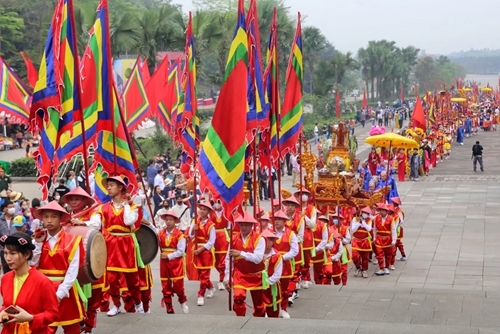This year, the festival and an associated culture and tourism program will take place in Viet Tri city – which houses the renown temple – as well as various other districts and towns across the province from April 9 to 18 (or the 1st to the 10th day of the third lunar month).
The legendary era of Hung Kings marks the beginning of nation-building, laying the foundation of present-day Vietnam. Sci-tech advancements have helped the discovery of archaeological sites proving the existence of the era in history, which marked the transition from tribal society to a period of social stratification and the emergence of the Vietnamese people’s first state. Although its exact duration is yet to be determined, according to the genealogy, the Hung Kings dynasty lasted for over 2000 years, estimated from the 7th century BCE to 258 BCE.
    |
 |
|
The procession to the Hung Kings Temple is a central element of festival. |
The era established precious traditions of the Vietnamese people – diligence and creativity in production, solidarity in overcoming natural disasters, and courage and resilience in the struggle against foreign invaders. These precious traditions are a source of strength that helps them thrive despite difficulties and challenges, defeat invading enemies, and build a stronger nation with a prominent position on the international stage.
The festival is an annual tradition for the descendants to return to the ancestral land paying tribute to the Hung Kings’ contribution to national building and safeguarding. This year, it is made even more remarkable with the Ancestral Land Culture-Tourism Week program.
Main rituals taking place throughout the festival include ceremonies at the temple to offer incense to Lac Long Quan and Au Co – the progenitors of Vietnamese people.
The Ancestral Land Cultural and Tourism Week is a highlight with various activities such as exhibitions at the Phu Tho Library and Hung Kings Museum, cooking contests of traditional dishes, Xoan singing performances, and a boat race.
Phung Thi Hoa Le, head of the tourism management office under the provincial Department of Culture, Sports, and Tourism, unveiled that on the festive occasion, the department is set to launch a new tour taking the Hung Kings Temple as its starting point to visit other scenic spots and attractions within the province.
According to the department, tourists participating in this tour will have the opportunity to practice the ritual of worshiping the Hung Kings at the temple, while enjoying the UNESCO - recognized intangible cultural heritage Xoan singing and visit its place of origin – the Lai Len temple. They will also visit the ancient Hung Lo temple, 1,300-year-old Tam Giang temple, Long Coc tea hill, and Xuan Son National Park.
On this occasion, the provincial tourism sector will also implement its development cooperation program with eight Northwestern provinces and Ho Chi Minh City, creating more links to lure visitors.
During the festival this year, a plethora of activities unfold in the heart of Viet Tri city. Among them are exhibitions at the Hung Kings Museum and Phu Tho Library, a trade fair of products under the One Commune, One Product (OCOP) at the Bao Da Stadium. The "Viet Tri Livemusic" street music program is set to entertain crowds at Van Lang park, while traditional Xoan singing performances are to captivate audiences in villages across the city. Spectacular fireworks will light up the night sky above the Southern stage of Van Lang Park on the evening of April 17.
Phu Tho boasts 967 historical and cultural relics, many unique scenic spots, and hundreds of distinctive folk festivals. Remarkably, it is the only locality in Vietnam having two intangible cultural heritages of humanity – namely the worship of Hung Kings and Phu Tho Xoan singing.
Source: VNA